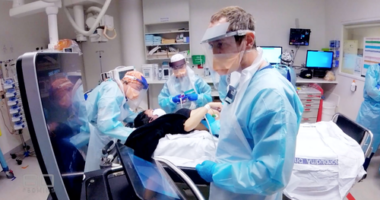Share this @internewscast.com
Isaac ultimately decided he wanted to help the couple and agreed to go ahead with the donation through Genea Fertility, one of Australia’s largest IVF clinics.

Isaac says the couple decided to go to Genea because of its welcoming staff. Credit: https://www.genea.com.au
In vitro fertilisation — or IVF as it is commonly known — is becoming increasingly popular in Australia, with one in every 18 births now resulting from the treatment.
In preparation for the donation, staff at Genea asked Isaac several probing questions about his medical history and conducted a series of psychological assessments.
You go through the longest form I’ve ever been through in my life. Any diagnosis you’ve had, any medication you’ve had.
“I also have a family history of autoimmune disease.”
The data he shared with Genea has been leaked online, leaving Isaac vulnerable to potential exploitation and blackmail.
Intimate data stolen
Not only could Isaac be at risk of being defrauded or blackmailed, but so too could any children conceived via his sperm, including his friend’s newborn.
“Our teams and cybersecurity experts are working hard to urgently review the impacted data. This is a detailed and complex process which will take some time to complete to ensure we can clearly understand the nature and extent of data that has been published and identify impacted individuals,” a statement on the site reads.

Information from clients of Genea was posted on the dark web after the data breach in February. Credit: Getty
Isaac has emailed the clinic directly, frustrated at what he says is a lack of transparency with customers.
“[Genea is] one of the top three IVF fertility specialists, you’d expect them to have really good security systems — and I assumed they did,” he says.
You don’t really feel confident in their ability to investigate if you have no idea what they’re investigating.
“I just want information about why this has happened. I’m just going in blind here.”
How data can be used against you and your children
“If they actually sense some form of vulnerability with their victim, for instance, the victim is trying to hide some sort of information from [their] employer or from their families, they’ll probably try to leverage that in a form of blackmail,” he says.

Consumer Data Right information only recorded one breach, and there were no breaches of Digital ID information or documents. Source: SBS News
Information such as a history of prescription medication can fetch a good price on the dark web, explains Kaafar, as the more a criminal knows about a victim, the more damage they can cause.
“This potentially impacts my life, but it also impacts the life of the next generation,” he says.
Cyberattacks are on the rise
Meanwhile, the IVF industry is generating huge income.
Monash IVF was also the target of a malicious cyberattack in 2019, when its email server was breached and customers received scam emails appearing to be from the clinic.
“There is increased malicious activity, there’s more hacking going on, there’s more data being stolen. Some of that’s because there’s just more data,” he says.
Businesses are collecting more and more data, and it’s more and more valuable. And so, there’s more reason for malicious actors to want to steal that data.
However, he also says increased reporting could be a good thing, as it signals that data breaches are becoming more detectable than in previous years.
Health-related scams are becoming more sophisticated
“So it makes them immediately attractive targets for cybercriminals.”
“They can be exactly what your official and formal documentation could look like.”
‘Taken my agency away’
“What happens if I get a job [that] is relatively high profile or dealing with sensitive activity?” he asks.

“Some things are more sensitive than others, and if you’re at the more extreme end of sensitivity, you want the ramifications to be higher and you also want to make sure there’s [an] incentive to not have this happen again.”
Can victims be compensated?
Faith Gordon, an associate professor of law at the Australian National University, says people impacted by breaches can make legal claims for the breach itself as well as its impact.

Associate professor Faith Gordon says there could be grounds for families to make claims for the data breach should they be impacted. Credit: Getty
“There’s a lot of legal and ethical accountability for these clinics,” she says.
Gordon explains that claimants can receive compensation for “losses” such as “embarrassment, humiliation and anxiety”.
“A data breach could expose very, very personal information, including names and dates of birth and donor status and notes about embryos.
So that can result in significant stigma and psychological harm and potentially future discrimination as well.










